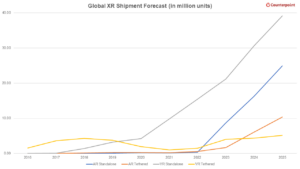Metaverse vs MMO Gaming: What will metaverse add to existing landscape
The metaverse has become a buzzword for many areas of the technology landscape. But many aspects of the metaverse are not new for the world of online gaming. It has been using the metaverse concepts of digital connectivity and interaction for years, going back to online chatrooms in the early 2000s, and more recently through massive multiplayer online games (MMOs). All this has created the starting point for Big Tech to take the metaverse to new areas through developing various software designs, but it needs to start from the hardware to access this new ‘world’. Meta – formerly known as Facebook – has been the most popular in marketing the concept of the metaverse and has had significant success in developing the initial hardware. Other companies are expected to jump on the metaverse hardware bandwagon, a highly anticipated entrant being Apple with their development of a VR headset.
What is MMO gaming?
MMO gaming often involves open-world games where your character can interact with many people globally within a set world to complete tasks and can communicate with others through audio or text-based communication. MMOs are not restricted to PC gaming. Microsoft and Sony have MMO games like Call of Duty available through their consoles. The first MMO, Neverwinter Nights, came out in 1991 using AOL for text-based communication with other players. MMO games have created mass followings, some of the most popular being RuneScape, World of Warcraft and The Elder Scrolls. The concept of MMO has become so popular that companies are now starting to incorporate successful authors and directors to help make these games as complex and riveting as possible. The newest and most popular game here is Elden Ring, which has George R. R. Martin (author of the global sensation Game of Thrones) writing the storyline.
What metaverse gaming offers and how the VR market will look because of it
MMOs follow a storyline and have set goals and tasks for players to work towards within the confines of the story even though they are open world. Metaverse gaming offers a more immersive experience where there are no confines of the typical gaming story progression. As the games themselves evolve, so does the hardware required to interact within these games in the most immersive way possible.
Metaverse gaming has been developed with the idea that VR headsets would be the prime mode of interaction. Meta developed its standalone QuestVR headsetseries to drive Metaverse gaming outside of the existing hardware confines of gaming – PCs, consoles and smartphones. In Q4 2021, standalone VR headsets contributed to over 90% of total VR headset shipments globally (mostlyQuest 2). This disparity between shipments of tethered and standalone headsets will reduce in future as console hegemons Sony and Microsoft release tethered headsets for their existing consoles.
Sony plans to release its new headset PlayStation VR2 by the end of 2022 but with the ongoing supply chain issues the OEM is facing, it is unlikely to release the device until 2023. Sony has announced that 20 games will be released by both first- and third-party developers with the headset. The games Sony releases with this headset will determine its success, as customers interested only in VR headsets will be more inclined to opt for Meta’s products, which are already on the market. Potential customers for Sony’s PlayStation VR2 will be those who already have a PlayStation console as well as those interested in the game titles that they cannot get with Meta. Many games have not been included on the Meta gaming platform as it needs to be connected to a Facebook account. At Counterpoint, we believe that that the VR standalone will greatly overtake other XR and reach almost 40M by 2025.

Metaverse gaming will not replace MMO and other existing forms
Even as metaverse gaming experiences an uptick with the release of newhardware and games, the popularity of MMOs will continue to see a wider fan base.PCMMO游戏通过existi方便ng platforms like STEAM, Xbox Game Pass, Google Stadia, Amazon Luna and other streaming-type platforms that have a wide variety of games that can reach anyone with a decent computer processor. MMOs on mobiles also create a new base of players who do not need to purchase a secondary device to access these games. At the same time, consoles continue to see record sales, with the PS5 and Xbox Series X still experiencing shortages two years after their release, thanks to the high demand combined with the lingering effects of thechipset shortagestriggered by the COVID-19 pandemic.


